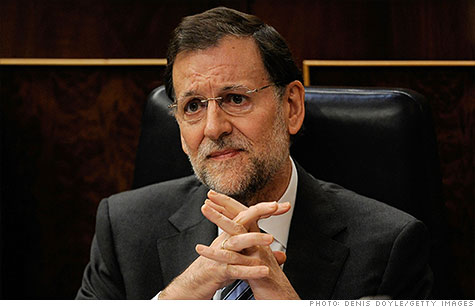Search News

The government of Spanish Prime Minister Mariano Rajoy has asked for help to clean up its banking system.
NEW YORK (CNNMoney) -- Spanish banks need up to €62 billion to restore stability to the nation's troubled financial sector, according to an independent audit published Thursday.
The Spanish government will make a formal request for loans at a meeting of euro area finance ministers later Thursday in Luxembourg, said Spanish Economy Minister Luis de Guindos, who called the request a "formality."
The reviews by financial consultants Oliver Wyman and Roland Berger are the first step in a two-part audit of the Spanish banking system commissioned by the government in May.
In a worst case scenario, Wyman found that Spanish banks would need between €51 billion and €62 billion euros in additional capital. Berger estimated the banks would need €51.8 billion.
The auditors used stress tests similar to those conducted by the International Monetary Fund, which said last month that banks need to raise €40 billion.
At a press conference in Madrid, officials from the Bank of Spain and the Spain's Economy Ministry said the audit focused on four banking groups already receiving government support.
Spain took over one of the nation's largest lenders, Bankia, in May. But officials said Spain's three largest banks wouldn't need to raise capital, even under a worst case scenario.
U.S.-listed shares of Banco Santander (SAN) and BBVA (BBVA) were lower in afternoon trading.
The uncertainty around Spanish banks has raised speculation that Spain will need a bailout similar to those given to Greece, Ireland and Portugal.
The yield on 10-year Spanish government bonds rose to a record high above 7% last week, although the rate has come down recently and Madrid successfully sold short-term debt Thursday.
Spain has asked the European Union for up to €100 billion to recapitalize insolvent banks, which are stuck with bad real estate loans following a major property bust. But the terms of the emergency funding and the exact amount will probably not be known until the second assessment is completed late next month.
It is also unclear exactly where the money will come from.
Investors are concerned that using funds from the European Stability Mechanism to bail out Spanish banks will subject private bondholders to bigger losses if the government needs to restructure its debts.
Fitch and Moody's both downgraded the Spanish government's credit rating following the request for external financial support. Both agencies also pointed to the weak Spanish economy, which is stricken with an unemployment rate near 25%.
Inventors are also worried about how Spain's problems will impact Italy. The fear is that bailing out Spain would drain the euro area's crisis resources and leave Italy without a safety net.
Italian Prime Minister Mario Monti has reportedly proposed a plan to ease borrowing costs for euro area governments by using bailout funds to buy sovereign debt.
However, it remains to be seen if German Chancellor Angela Merkel will be willing to take such a step, since it could reduce the incentive for governments to enact reforms that Berlin deems necessary.
Monti is expected to discuss the proposal with Merkel and the leaders of France and Spain at a meeting in Rome on Friday.
Under the plan proposed by Monti, the European Financial Stability Facility would intervene directly in the bond market.
EU leaders empowered the EFSF to buy government debt as part of an overhaul announced in September 2011. However, analysts say the move would require approval from all 17 euro area members.
Benoit Coeure, an executive board member of the European Central Bank, said he was surprised euro area leaders had not already used EFSF funds to buy bonds.
"Well certainly it's a mystery why the EFSF was allowed almost a year ago to undertake secondary market interventions and governments have not yet chosen to use that possibility," Coeure told the Financial Times.
Two reasons governments may be hesitant: The EFSF is already overextended and the ESM is not yet up and running.
The EFSF, set up in 2010 with €440 billion, has backed bailouts for Greece, Ireland and Portugal. Analysts say it now has about €200 billion in available resources.
The ESM is earmarked at €500 billion, but it is expected to have only €107 billion lending capacity when it comes on line in July.
-- CNN's Madrid bureau chief Al Goodman contributed to this report ![]()
| Index | Last | Change | % Change |
|---|---|---|---|
| Dow | 32,627.97 | -234.33 | -0.71% |
| Nasdaq | 13,215.24 | 99.07 | 0.76% |
| S&P 500 | 3,913.10 | -2.36 | -0.06% |
| Treasuries | 1.73 | 0.00 | 0.12% |
| Company | Price | Change | % Change |
|---|---|---|---|
| Ford Motor Co | 8.29 | 0.05 | 0.61% |
| Advanced Micro Devic... | 54.59 | 0.70 | 1.30% |
| Cisco Systems Inc | 47.49 | -2.44 | -4.89% |
| General Electric Co | 13.00 | -0.16 | -1.22% |
| Kraft Heinz Co | 27.84 | -2.20 | -7.32% |
| Overnight Avg Rate | Latest | Change | Last Week |
|---|---|---|---|
| 30 yr fixed | 3.80% | 3.88% | |
| 15 yr fixed | 3.20% | 3.23% | |
| 5/1 ARM | 3.84% | 3.88% | |
| 30 yr refi | 3.82% | 3.93% | |
| 15 yr refi | 3.20% | 3.23% |
Today's featured rates: